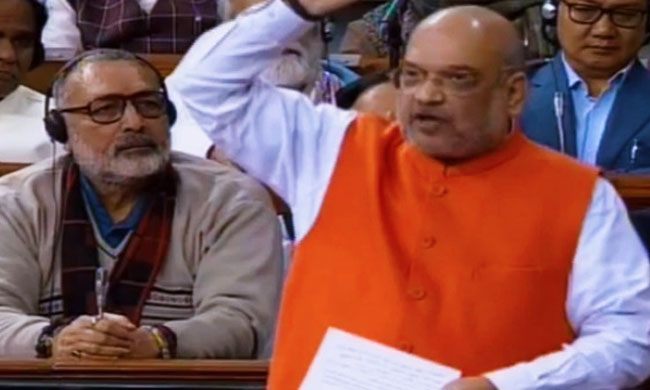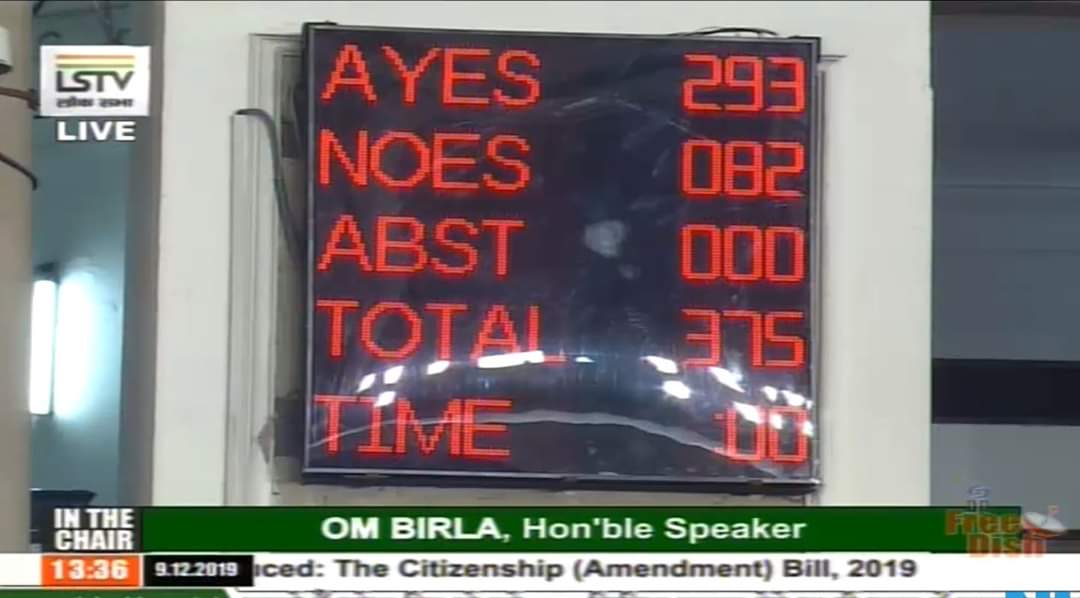
Citizenship Amendment Bill Introduced In Lok Sabha Amidst Opposition Uproar
by LIVELAW NEWS NETWORKThe motion to introduce the Citizenship Amendment Bill 2019 was cleared in the Lok Sabha on Monday with 293 'ayes' and 82 'noes'.
Union Home Minister Amit Shah moved the motion to introduce the controversial bill, which seeks to relax the conditions for acquisition of Indian citizenship for non-Muslim migrants from Pakistan, Bangladesh and Afghanistan.

The motion faced stiff resistance from the opposition parties. Adhir Ranjan Chowdhury, the head of Congress legislative party, read out the preamble of the Constitution and said the bill was against constitutional principles. The bill is divisive and sectarian, he said.
In reply, Shah said that the merits of the bill can be debated after its introduction, and pointed out that what was being considered was only the motion to introduce the bill. The very introduction of the bill can be opposed only on the ground that Parliament has no competence to deal with the subject, the Union Minister said.
At this juncture, N K Premachandran, RSP MP from Kollam, said that the bill was beyond the competence of the Parliament. By linking citizenship to religion, the bill violated the basic features of the Constitution, he argued. Indian Union Muslim League MP P K Kunhalikutty and Congress MP Shashi Tharoor also spoke against the bill.
In reply, Amit Shah said that the bill did not target even even "0.001 minorities". The minister said that Article 14 allowed reasonable classification. He pointed out that Indira Gandhi government had allowed special rights to refugees from Bangladesh after the 1971 war. Relaxation of citizenship norms were granted to people of Indian origin from Uganda, he said. These were cited as instances of reasonable classification by the minister.
"In Afghanistan,Pakistan and Bangladesh, Hindus, Sikhs, Buddhists, Christians, Parsis and Jains have been discriminated against. So this bill will give these persecuted people citizenship. Also, the allegation that this bill will take away the rights of Muslims is wrong," Amit Shah said in Lok Sabha.
Shah also alleged that if Congress had not partitioned the country on the basis of religion, the bill would not have been necessary.
During the debate, Hyderabad MP Asaduddin Owaisi (AIMIM) made certain sharp comments by comparing Shah to Hitler.
"I appeal to you (Speaker), save country from such a law and save home minister also," Owaisi said. "Otherwise like in Nuremberg race laws and Israel's citizenship act, home minister's name will be featured with Hitler [German dictator] and David Ben-Gurion [former Israeli PM]."
Speaker Om Birla said that these remarks would be expunged from the record.
After an acrimonious debate, the opposition demanded a division of votes on the motion to introduce the bill.
The motion was cleared amidst chants of 'Bharat mata ki jai".
As per the bill, Hindus, Sikhs, Buddhists, Parsis, Jains and Christians who migrated to India without travel documents from Pakistan, Bangladesh and Afghanistan on or before December 31, 2014 will not be regarded as illegal migrants. This is proposed to be done by inserting a new proviso to Section 2(1)(b) of the Citizenship Act 1955. The present Citizenship Act does not recognize the claims of illegal migrants for citizenship.
The bill also proposes to relax the condition for acquisition of citizenship by naturalization for non-Muslim migrants from these countries. As per the existing law, a person should be a resident in India for the period of 12 months immediately preceding the date of application, and also should have been residing in India for 11 out of the 14 years preceding the said period of 12 months.
This Bill proposes to make non-Muslim migrants from Pakistan, Bangladesh and Afghanistan eligible for citizenship by naturalization if they can establish their residency in India for five years instead of existing eleven years.
A significant feature of the Bill is that the relaxations for citizenship by naturalization will not be applicable to tribal areas of Assam, Meghalaya, Mizoram or Tripura included in the Sixth Schedule of the Constitution and the area covered under "The Inner Line" notified under the Bengal Eastern Frontier Regulation 1873.
This exclusion is given apparently in view of the protests from North-Eastern states against the previous Citizenship Amendment Bill, which was cleared by the 16th Lok Sabha in January 2019. That bill had triggered violent protests in North-Eastern states on the ground that it will legitimize the stay of several illegal migrants, disturbing the local demographics.